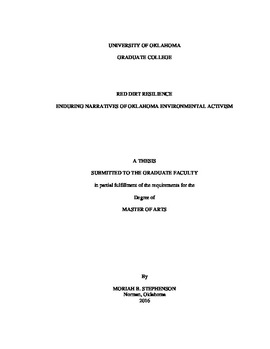| dc.contributor.advisor | Klein, Misha | |
| dc.contributor.author | Stephenson, Moriah | |
| dc.date.accessioned | 2016-05-11T16:11:12Z | |
| dc.date.available | 2016-05-11T16:11:12Z | |
| dc.date.issued | 2016-05-13 | |
| dc.identifier.uri | https://hdl.handle.net/11244/34609 | |
| dc.description.abstract | This thesis explores the relationship between dominant narratives of Oklahoma identity and counter-narratives of Oklahoma identity. I consider how the dominant narrative of Oklahoma identity is constructed in relationship to the oil and gas industry, a powerful force in Oklahoma life. The dominant narrative of Oklahoma identity frames oil and gas as a source of resilience, progress, and a benefit to all. Histories and experiences of people who have challenged or been persecuted by the oil and gas industry are often silenced or erased. Examples of this are histories of Indigenous peoples, oil workers, socialists, and many different activist communities. Environmental activists working within Oklahoma employ multiple strategies to illuminate counter-narratives of Oklahoma history and identity; however, the powerful presence of the oil and gas industry in Oklahoma creates challenges for activists. Not surprisingly, at times activists reproduce dominant narratives of statehood unknowingly and struggle to effectively organize in the face of repression and social and cultural control. Despite this, environmental activists challenge dominant narratives of Oklahoma identity through counter-narratives and action. | en_US |
| dc.language | en_US | en_US |
| dc.subject | Environmental Activism, Oklahoma Identity, Activist Anthropology | en_US |
| dc.title | Red Dirt Resilience: Enduring Narratives of Oklahoma Environmental Activism | en_US |
| dc.contributor.committeeMember | O'Neill, Sean | |
| dc.contributor.committeeMember | Theriault, Noah | |
| dc.date.manuscript | 2016-05-11 | |
| dc.thesis.degree | Master of Arts | en_US |
| ou.group | College of Arts and Sciences::Department of Anthropology | en_US |
